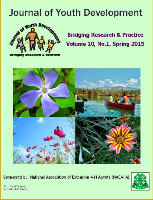
Journal of Youth Development
Scope & Guideline
Advancing Knowledge for Youth Empowerment
Introduction
Aims and Scopes
- Positive Youth Development (PYD):
A core focus of the journal is on Positive Youth Development frameworks, emphasizing strengths-based approaches that promote resilience, life skills, and healthy development among youth. - Community and Program Evaluation:
The journal emphasizes the importance of evaluating community-based programs and initiatives aimed at youth, providing insights into effective practices and outcomes that can inform future programming. - Diversity, Equity, and Inclusion (DEI):
There is a consistent emphasis on understanding and addressing issues of diversity, equity, and inclusion within youth programs, ensuring that marginalized voices are represented and heard. - Social-Emotional Learning (SEL):
The journal explores the integration of social-emotional learning within youth programs, focusing on how such initiatives can improve youth outcomes and overall well-being. - Youth Engagement and Empowerment:
Research on youth engagement strategies and empowerment practices is a significant theme, highlighting how young people can take active roles in their development and communities. - Innovative Program Models:
The journal features innovative models and approaches to youth development, including the use of technology and creative methodologies to engage and support youth.
Trending and Emerging
- Mental Health and Well-Being:
There is an increasing focus on mental health and well-being in youth development, with studies examining the role of extracurricular activities, community support, and programmatic interventions in addressing mental health crises among young people. - Culturally Relevant Practices:
A trend towards culturally relevant practices in youth programs is emerging, emphasizing the importance of integrating cultural identity and community context into youth development frameworks. - Technology Integration in Youth Programs:
The journal is increasingly publishing on the integration of technology, including virtual and digital tools, in youth programming, reflecting the growing relevance of technology in engaging and supporting youth. - Social Justice and Advocacy:
Research focusing on social justice, youth activism, and advocacy is gaining traction, highlighting the role of youth in addressing systemic issues and promoting change within their communities. - Trauma-Informed Approaches:
An emerging theme is the application of trauma-informed practices in youth development, recognizing the impact of trauma on youth and the importance of supportive environments that promote healing and resilience.
Declining or Waning
- Traditional Educational Methods:
There appears to be a waning focus on traditional educational methods for youth development, as the journal increasingly prioritizes innovative and holistic approaches that incorporate experiential learning and community engagement. - Single-Dimensional Youth Programs:
The emphasis on single-dimensional programs that address only one aspect of youth development is decreasing. The journal now leans towards comprehensive approaches that integrate multiple dimensions of youth lives, such as mental health, social skills, and community involvement. - Generalized Youth Development Research:
Research that lacks specificity or contextual relevance is becoming less prominent. The journal is moving towards more targeted studies that address particular populations, such as marginalized youth or those in specific community contexts.
Similar Journals
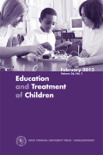
Education and Treatment of Children
Transforming Understanding: Bridging Research and Practice in Child DevelopmentEducation and Treatment of Children is a leading academic journal published by SPRINGERNATURE, dedicated to advancing the understanding of child development and education. With an ISSN of 0748-8491 and an E-ISSN of 1934-8924, this journal has been a significant resource in the fields of Developmental and Educational Psychology and Education, as evidenced by its categorization in Q3 and Q2 respectively in the 2023 category quartiles. Spanning publications from 2005 to 2024, it aims to disseminate innovative research that informs best practices for the education and treatment of children. It holds a notable position in the academic landscape, ranking #859 in Social Sciences - Education and #250 in Psychology - Developmental and Educational Psychology according to Scopus. This journal serves as a crucial platform for researchers, professionals, and students, fostering collaboration and the exchange of knowledge essential for improving educational outcomes and interventions for children.

Child & Youth Services
Elevating Voices: A Platform for Child and Youth AdvocacyChild & Youth Services is an esteemed academic journal published by Routledge Journals, Taylor & Francis Ltd, focusing on the multidimensional aspects of child and youth welfare, development, and services. With an ISSN of 0145-935X and an E-ISSN of 1545-2298, this journal has been a vital platform for research disseminating innovative strategies and practices for improving the quality of life for children and adolescents globally. Its editorial board comprises experts in the field, ensuring rigorous peer review and high scholarly standards. The journal currently holds a Q3 rank in Health (Social Science) and a Q2 rank in Social Sciences (Miscellaneous) indicating its growing influence and relevance. Researchers and practitioners can greatly benefit from its comprehensive discourse, which spans multiple years of converged research from 1977 to 2024. Although not open access, the journal provides vital insights into contemporary issues, making it essential reading for those engaged in child and youth services, policy-making, and academic study.
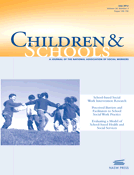
Children & Schools
Bridging education and social health for children's success.Children & Schools, published by Oxford University Press, serves as a vital academic journal that bridges the fields of education and social health, demonstrating its importance in addressing the multifaceted challenges facing children in educational settings. With an ISSN of 1532-8759, this journal is committed to disseminating high-quality research from 1978 to the present, marking its influential position as a Q2 ranked journal in both Education and Health (social science) categories as of 2023. The journal's engaging content reflects its dedication to advancing knowledge and practice within these critical areas, appealing to researchers, educators, social workers, and policymakers alike. It is especially noted for its accessibility through robust scholarly contributions, making it a pivotal resource for understanding the developmental and social needs of children in schools. As a member of the Scopus rankings, boasting a 70th percentile in Education and a 63rd percentile in Health (social science), Children & Schools remains essential for advancing research and best practices in nurturing the educational environment for children.

Aloma-Revista de Psicologia Ciencies de l Educacio i de l Esport
Innovating Research for a Healthier, Smarter FutureAloma-Revista de Psicologia Ciencies de l Educacio i de l Esport, published by Ramon Llull University in Spain, serves as a pivotal platform for the dissemination of cutting-edge research across the intersecting domains of psychology, education, and sports sciences. With an ISSN of 1138-3194 and an E-ISSN of 2339-9694, Aloma is indexed in prominent databases and categorized within Q3 quartile rankings in various fields, including Psychology, Education, and Physical Therapy. This journal's accessibility and commitment to enhancing scholarly discourse make it an essential resource for researchers, practitioners, and students seeking to deepen their knowledge and advance their professional practices. Leveraging its convergence years from 2018 to 2024, Aloma aims to foster interdisciplinary understanding and innovative solutions to contemporary challenges in the social sciences and health professions, making it a vital contributor to the academic community.

Journal of Sport for Development
Advancing Knowledge in Sport and DevelopmentJournal of Sport for Development is a pioneering academic journal published by VERA SOLUTIONS, BENEFIT LLC, dedicated to advancing research and discussion at the intersection of sports, development, and social sciences. With an ISSN of 2330-0574, this journal serves as a crucial platform for interdisciplinary scholarship, highlighting innovative approaches to using sports as a tool for social change and community development. Since its inception in 2019, the journal has achieved impressive rankings, positioned in the Q2 category for both Development and Sociology and Political Science, and Q3 in Tourism, Leisure and Hospitality Management, showcasing its growing influence within the academic community. As researchers and practitioners increasingly recognize the role of sport in fostering social cohesion, empowerment, and sustainable development, this journal plays an essential role in shaping the discourse and policy surrounding these topics. Open access is not currently available, but the comprehensive research articles aim to provide valuable insights for academics, professionals, and students alike, fostering a deeper understanding of the broader implications of sports in various social and developmental contexts.
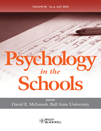
PSYCHOLOGY IN THE SCHOOLS
Advancing Educational Practices Through Psychological ResearchPsychology in the Schools, published by Wiley, is a leading journal that explores the dynamic intersection of psychology and educational practices, significantly contributing to the fields of Developmental and Educational Psychology and Education. Since its inception in 1964, this esteemed journal has provided a platform for researchers, educators, and practitioners to disseminate innovative findings and theoretical advancements, fostering a deeper understanding of psychological principles in school settings. With an impressive Q2 ranking in Developmental and Educational Psychology and a Q1 ranking in Education as of 2023, it ranks within the top tiers of academic journals, reflecting its impact and relevance in contemporary discourse. Although it does not offer an Open Access option, those interested in pioneering research and practical applications in educational psychology will find invaluable resources and insights within its pages. As the journal continues to evolve towards its 60th anniversary in 2024, it remains committed to addressing the needs and challenges faced by students and educators alike, making it an essential resource for anyone invested in the psychological aspects of education.
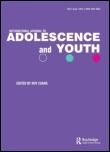
International Journal of Adolescence and Youth
Shaping the future of adolescent studies through open access.The International Journal of Adolescence and Youth, published by Routledge Journals, Taylor & Francis Ltd, stands as a premier platform dedicated to advancing the understanding of the social, emotional, and psychological dimensions affecting youth and adolescence. With an ISSN of 0267-3843 and an E-ISSN of 2164-4527, this esteemed journal has been committed to open access since 2014, allowing for broad dissemination of research that informs policy and practice. Based in the United Kingdom, this journal has exhibited its critical importance in the field by achieving a Q1 ranking in Health (social science) and placing 20th out of 371 in Scopus rankings with a remarkable 94th percentile standing. Covering a comprehensive range of topics from mental health to social influences, the journal serves as an essential resource for researchers, professionals, and students alike who are engaged in the multidisciplinary study of adolescent health and development. The publication timeline spans from 1987 to 2024, reflecting its rich history and commitment to contributing valuable knowledge to the academic community.

Child and Adolescent Social Work Journal
Transforming Challenges into Opportunities in Social WorkChild and Adolescent Social Work Journal is a premier scholarly publication focused on the critical field of social work, particularly addressing the unique needs and challenges faced by children and adolescents. Published by Springer in the United States, this journal boasts an impressive impact factor reflected in its Q1 ranking in Social Sciences (miscellaneous) and Q2 in Social Work as of 2023, evidencing its influential contributions to the discipline. The journal is indexed with notable recognition, including a ranking of #99 out of 604 in Social Sciences (miscellaneous) and #57 out of 275 in General Social Sciences, showcasing its robust academic standing. With a publication history dating from 1984 to 2024, it serves as a crucial platform for researchers, professionals, and students to exchange insights, develop practices, and inform policy-making that supports the welfare of youth. The journal’s commitment to advancing knowledge and fostering an understanding of complex social issues ensures its continued relevance in fostering the growth of effective social work practices.
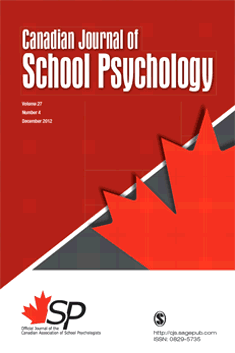
Canadian Journal of School Psychology
Empowering Educators with Evidence-Based Insights.Canadian Journal of School Psychology, published by SAGE Publications Inc, is a leading scholarly journal dedicated to advancing research and practice in the field of School Psychology. With an ISSN of 0829-5735 and an E-ISSN of 2154-3984, this journal serves a global audience from its base in the United Kingdom. As a recognized publication since 1985, the journal has evolved to maintain its relevance in the ever-changing landscape of educational psychology, achieving an impressive Q2 ranking in the Developmental and Educational Psychology category, according to the latest 2023 data. It features a variety of articles, including empirical studies, theoretical papers, and comprehensive reviews, aimed at fostering evidence-based practices for educators and practitioners. While not an open-access journal, it provides valuable insights and resources that support the continued professional development of researchers and practitioners in psychology and education. The Canadian Journal of School Psychology plays a crucial role in disseminating knowledge and driving innovation within the field, making it an essential resource for anyone interested in enhancing the psychological well-being of students.

Residential Treatment for Children & Youth
Innovating approaches for youth mental health.Residential Treatment for Children & Youth is a leading journal published by Routledge Journals, Taylor & Francis Ltd, specializing in the fields of social sciences, law, and child health. Established in 1986, this peer-reviewed journal offers a vital platform for the dissemination of research focused on the behavioral and psychological treatment of children and adolescents within residential settings. With a Scopus ranking of #246 in Social Sciences (Law) and #180 in Pediatrics, this journal maintains a high impact factor and primarily caters to academics, practitioners, and policymakers interested in the evolving challenges and best practices in residential treatment. Although it does not provide Open Access options, it remains a key resource for those seeking rigorous and insightful studies in child welfare and mental health. By bridging research and practice, Residential Treatment for Children & Youth aims to improve outcomes for vulnerable youth and exemplifies a commitment to advancing knowledge in this critical area.